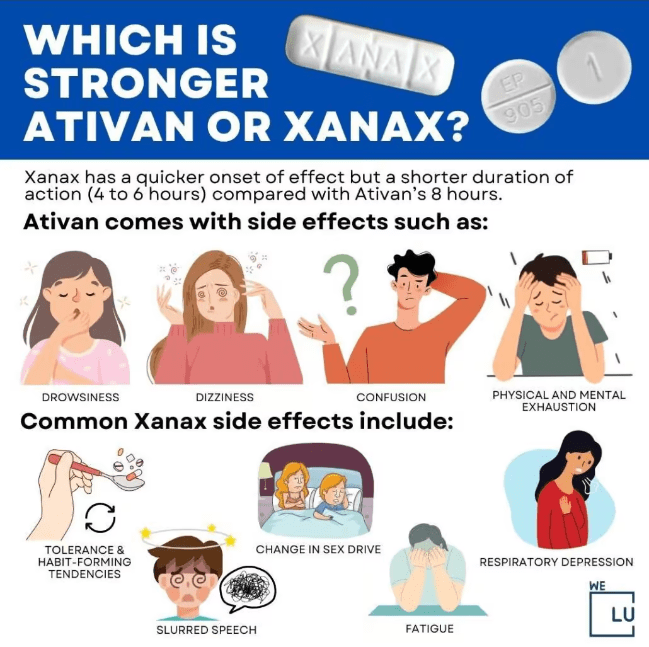What Are Ativan Vs Valium?
Ativan and Valium are both medications belonging to the benzodiazepine class, commonly used to treat anxiety and related conditions.
Ativan, also known by its generic name lorazepam, is a short-acting benzodiazepine that acts quickly to alleviate anxiety symptoms. It enhances the effects of a neurotransmitter called gamma-aminobutyric acid (GABA) in the brain, resulting in a calming effect. Ativan is often prescribed for generalized anxiety disorder, panic disorder, and insomnia. It is available in various forms, including tablets, oral solutions, and injections.
Valium, known by its generic name diazepam, is a long-acting benzodiazepine that relieves anxiety symptoms. Like Ativan, Valium enhances the effects of GABA in the brain. However, Valium has a longer duration of action compared to Ativan. It is commonly used to treat anxiety disorders, muscle spasms, seizures, and alcohol withdrawal symptoms. Valium is available in tablet form, as an oral solution, and as an injectable solution.
While both medications effectively manage anxiety, they differ in onset of action, duration of effect, and potency. The choice between Ativan and Valium depends on the specific needs of the individual and the nature of their condition, and a healthcare professional best determines it. Both medications can cause dependence and should be used only under medical supervision.
Difference Between Ativan And Valium
| Aspect | Ativan (Lorazepam) | Valium (Diazepam) |
|---|---|---|
| Onset of Action | Rapid onset (within 30-60 minutes) | Intermediate onset (within 1-2 hours) |
| Duration of Effect | Short-acting (4-6 hours) | Long-acting (6-24 hours) |
| Potency | Less potent | More potent |
| Medical Uses | Anxiety disorders, panic attacks, insomnia | Anxiety disorders, muscle spasms, seizures |
| Alcohol Withdrawal | It may require dosage adjustment due to slower metabolism | Preferred for managing alcohol withdrawal symptoms |
| Dosage Forms | Tablets, oral solutions, injections | Tablets, oral solutions, injectable solution |
| Drug Interactions | Interacts with a variety of medications | Interacts with a variety of medications |
| Withdrawal Potential | Higher risk of withdrawal symptoms | Lower risk of withdrawal symptoms |
| Pediatric Use | Limited data and caution in the pediatric population | It may require dosage adjustment due to slower metabolism |
| Elderly Use | It may require dosage adjustment due to slower metabolism | May require dosage adjustment due to slower metabolism |
This table provides a general overview and is not exhaustive. It’s crucial to consult with a healthcare professional for accurate and personalized information regarding the use of Ativan and Valium.

Skip To:
Learn More:
- Is Ativan Addictive? Lorazepam Addiction Signs, Symptoms, & Treatment
- Klonopin Detox Timeline, Clonazepam Withdrawal Symptoms, & Treatment
- What is Klonopin? (Clonazepam) Klonopin Uses, Dosage, Side Effects, & Drug Abuse
- Ativan Vs Xanax, What Is The Difference?
- How Long Does Ativan Stay In Your System?
- What Is A Prescription Pill Detox Program?
- Prescription Drugs Addiction Causes & Symptoms
Get Help. Get Better. Get Your Life Back.
Searching for Accredited Drug and Alcohol Rehab Centers Near You?
Even if you have failed previously and relapsed, or are in the middle of a difficult crisis, we stand ready to support you. Our trusted behavioral health specialists will not give up on you. When you feel ready or just want someone to speak to about therapy alternatives to change your life call us. Even if we cannot assist you, we will lead you to wherever you can get support. There is no obligation. Call our hotline today.
(844) 597-1011Popular Klonopin Vs Ativan FAQs
-
What Is The Most Notable Difference Between Valium Vs Ativan?
The most notable difference between Valium (diazepam) and Ativan (lorazepam) lies in their pharmacokinetic properties. Valium is a long-acting benzodiazepine, meaning it has a prolonged duration of effect, typically lasting 6 to 24 hours. On the other hand, Ativan is a short-acting benzodiazepine, providing relief for approximately 4 to 6 hours. This disparity in duration can influence the choice of medication based on the individual’s needs and the condition being treated. It is essential to consult with a healthcare professional to determine which medication is most suitable.
-
Between Valium And Ativan, Which One Has The Higher Abuse Potential?
Both Valium and Ativan belong to the benzodiazepine class of medications, which carry a risk of dependence and abuse. However, Valium is generally considered to have a higher abuse potential than Ativan. This is primarily due to Valium’s higher potency and longer duration of action. Misuse or prolonged medication use without proper medical supervision can lead to dependence, addiction, and other adverse effects. It’s crucial to use these medications strictly as prescribed and under the guidance of a healthcare professional.
-
Are Valium Or Ativan Dangerous?
Like any medication, Valium (diazepam) and Ativan (lorazepam) can have risks and potential dangers if not used appropriately. Both medications are generally safe when used as prescribed and under medical supervision. However, they can cause side effects, including drowsiness, dizziness, impaired coordination, and cognitive difficulties. Additionally, benzodiazepines carry a risk of dependence and withdrawal symptoms if used for an extended period or in higher doses. It’s essential to follow the prescribed dosage and duration, avoid alcohol and other sedatives while taking these medications, and consult a healthcare professional to understand and manage the associated risks.
Ativan Vs Valium Factsheet
Ativan Overview
Ativan (lorazepam) is a fast-acting benzodiazepine for treating anxiety and seizures. It enhances the effects of GABA in the brain, providing calming and sedative effects. It is available in various forms and takes effect within 30-60 minutes. The duration of Ativan’s effects is approximately 6-8 hours. However, caution is advised regarding potential side effects and the risk of dependence. Regular communication with a healthcare provider is essential for safe and effective use.
Ativan Vs Valium Dosage
For Ativan (lorazepam):
- Generalized Anxiety Disorder: The usual adult starting dose is 2 to 3 mg daily, divided into two to three doses.
- Insomnia: The typical adult dose is 2 to 4 mg before bedtime.
- Panic Disorder: The initial adult dose is 0.5 to 1 mg, given two to three times a day. The dosage may be increased if necessary.
For Valium (diazepam):
- Anxiety Disorders: The usual adult dose ranges from 2 to 10 mg, taken twice to four times daily.
- Muscle Spasms: The typical adult dose is 2 to 10 mg, taken twice to four times daily.
- Seizures: The initial adult dose is 2 to 10 mg, taken twice to four daily. The dosage may be adjusted as needed.
- Alcohol Withdrawal: The usual adult dose is 10 mg, taken three to four times during the first 24 hours, followed by reduced dosages as determined by the healthcare professional.
Valium Overview
Valium, also known by its generic name diazepam, is a medication classified as a benzodiazepine. It is primarily prescribed for treating anxiety disorders, muscle spasms, seizures, and alcohol withdrawal symptoms. Valium enhances the effects of a neurotransmitter called gamma-aminobutyric acid (GABA) in the brain, resulting in a calming and sedative effect. It is available in various forms, including tablets, oral, and injectable solutions.
Ativan Vs Valium Side Effects
Common side effects of Ativan may include:
- Drowsiness.
- Dizziness.
- Weakness.
- Fatigue.
- Confusion.
- Slurred speech.
- Lack of coordination.
Common side effects of Valium may include:
- Drowsiness.
- Fatigue.
- Dizziness.
- Muscle weakness.
- Lack of coordination.
- Headache.
- Dry mouth.
Valium and Ativan Statistics
This section delves into Valium (diazepam) and Ativan (lorazepam) statistics to better understand these medications’ impact and usage patterns. By exploring statistical data, we can shed light on their prevalence, prescribing trends, and potential implications for public health. Understanding the statistical landscape surrounding Valium and Ativan provides valuable insights into their usage, safety concerns, and broader implications for healthcare professionals and patients. Let us examine the numbers and uncover the statistical picture of these widely prescribed benzodiazepines.
57.5 million
In 2019, benzodiazepines were prescribed during approximately 57.5 million office visits, accounting for 4.4% of all visits.
Source: National Ambulatory Medical Care Survey
4.6 million
In 2020, an estimated 4.6 million individuals aged 12 or older reported misusing benzodiazepines.
Source: The National Survey on Drug Use and Health
9,000
Benzodiazepines were involved in approximately 9,000 overdose deaths in the United States in 2019.
Source: National Institute on Drug Abuse

Get Your Life Back
Find Hope & Recovery. Get Safe Comfortable Detox, Addiction Rehab & Dual Diagnosis High-Quality Care.
Hotline(844) 597-1011
Ativan Vs Xanax Vs Valium
Ativan (lorazepam), Xanax (alprazolam), and Valium (diazepam) are all medications belonging to the benzodiazepine class, commonly used to treat anxiety and related conditions. While they share similarities, there are distinct differences between them. Here’s a comparison of Ativan, Xanax, and Valium:
- Indications:
- Ativan: Used for generalized anxiety disorder, panic disorder, and insomnia.
- Xanax: Primarily prescribed for anxiety disorders and panic disorders.
- Valium: Used for anxiety disorders, muscle spasms, seizures, and alcohol withdrawal symptoms.
- Onset and Duration of Action:
- Ativan: Rapid onset of action (within 30-60 minutes) and a relatively short duration of effect (4-6 hours).
- Xanax: Rapid onset of action (within 20-30 minutes) and a moderate duration of effect (6-12 hours).
- Valium: Intermediate onset of action (within 1-2 hours) and a long duration of effect (6-24 hours).
- Potency:
- Ativan: Less potent compared to Xanax and Valium.
- Xanax: Considered more potent than Ativan but less potent than Valium.
- Valium: Generally considered the most potent among the three.
- Half-Life:
- Ativan: Shorter half-life (12-18 hours).
- Xanax: Intermediate half-life (11-16 hours).
- Valium: Longer half-life (20-80 hours), contributing to its extended effect duration.
- Prescribing Considerations:
- Ativan and Xanax are often prescribed for short-term use due to their shorter half-lives and potential for dependence.
- Valium is sometimes preferred for longer-term use or in cases where a longer duration of action is needed.
All three medications can cause side effects, carry a risk of dependence, and should be used under medical supervision. The choice between Ativan, Xanax, and Valium depends on factors such as the specific condition being treated, the patient’s response, and the healthcare professional’s judgment. It’s crucial to consult with a healthcare professional to determine the most appropriate medication for your needs.
Ativan To Valium Conversion
Converting from Ativan (lorazepam) to Valium (diazepam) uses an approximate equivalency ratio. However, individual patient factors and specific medical circumstances may influence the conversion. The following conversion is commonly used:
- 1 mg of Ativan is roughly equivalent to 10 mg of Valium.
For example, if a patient takes 2 mg of Ativan, the approximate conversion to Valium would be 20 mg.
Consult with a healthcare professional for an accurate and personalized conversion, as they will consider various factors such as the patient’s medical history, response to treatment, and individual needs. Benzodiazepine conversions should always be performed under medical supervision to ensure the safety and effectiveness of the transition.
Valium Half Life Vs Ativan
The half-life of a medication refers to the time it takes for half of the drug to be eliminated from the body. Here’s a comparison of the half-lives of Valium (diazepam) and Ativan (lorazepam):
- Valium (diazepam): The half-life of Valium can range from approximately 20 to 80 hours. It has a long half-life, meaning it takes a relatively long time for the body to eliminate half of the drug.
- Ativan (lorazepam): Ativan’s half-life is shorter than Valium, typically around 12 to 18 hours. It has a shorter half-life compared to Valium, meaning it is cleared from the body more quickly.
The difference in half-lives between Valium and Ativan can influence factors such as duration of action and dosing frequency. Valium’s longer half-life contributes to its extended duration of effect, whereas Ativan’s shorter half-life may necessitate more frequent dosing to maintain its therapeutic effects.
First-class Facilities & Amenities
World-class High-Quality Addiction & Mental Health Rehabilitation Treatment
Rehab Centers TourRenowned Addiction Centers. Serene Private Facilities. Inpatient rehab programs vary.
Addiction Helpline(844) 597-1011Proven recovery success experience, backed by a Team w/ History of:
15+
Years of Unified Experience
100s
5-Star Reviews Across Our Centers
10K
Recovery Success Stories Across Our Network
- Low Patient to Therapist Ratio
- Onsite Medical Detox Center
- Comprehensive Dual-Diagnosis Treatment
- Complimentary Family & Alumni Programs
- Coaching, Recovery & Personal Development Events
Which Is Stronger Ativan Or Valium?
When comparing the strength of Ativan (lorazepam) and Valium (diazepam), it’s essential to consider that “strength” can refer to different aspects of the medication.
In terms of potency, Valium is generally considered more potent than Ativan. This means a lower dose of Valium may produce similar effects to a higher dose of Ativan. However, individual medication responses can vary, and what works well for one person may not be the same for another.
Another aspect to consider is the duration of action. Valium has a longer half-life and duration of effect compared to Ativan. Valium’s effects may last 6 to 24 hours, while Ativan’s effects typically last around 4 to 6 hours. The longer duration of Valium may be beneficial in certain situations, such as managing anxiety throughout the day.

The choice between Ativan and Valium should be based on individual factors, such as the specific condition being treated, the patient’s medical history, and the healthcare professional’s expertise. An individual’s appropriate medication and dosage should be determined by a healthcare professional who can consider these factors and make an informed decision.
World-class, Accredited, 5-Star Reviewed, Effective Addiction & Mental Health Programs. Complete Behavioral Health Inpatient Rehab, Detox plus Co-occuring Disorders Therapy.
CALL(844) 597-1011End the Addiction Pain. End the Emotional Rollercoaster. Get Your Life Back. Start Drug, Alcohol & Dual Diagnosis Mental Health Treatment Now. Get Free No-obligation Guidance by Substance Abuse Specialists Who Understand Addiction & Mental Health Recovery & Know How to Help.
We Level Up Dual Diagnosis Treatment
We Level Up is a highly regarded rehab center known for its comprehensive approach to helping individuals with addiction and co-occurring mental health issues. They combine evidence-based therapies, expert medical care, and a holistic perspective to guide individuals toward successful recovery. The center offers diverse therapeutic techniques, including individual counseling and group therapy, to address underlying causes and foster emotional growth. Behavioral therapies, such as CBT and DBT, equip individuals with skills to manage cravings and triggers. Medication management may be included in treatment plans to support withdrawal, stabilize mood, and address co-occurring conditions, all closely monitored by a medical team.
Experience Transformative Recovery at We Level Up Treatment Centers.
See our authentic success stories. Get inspired. Get the help you deserve.
Start a New Life
Begin with a free call to an addiction & behavioral health treatment advisor. Learn more about our dual-diagnosis programs. The We Level Up Treatment Center Network delivers recovery programs that vary by each treatment facility. Call to learn more.
- Personalized Care
- Caring Accountable Staff
- World-class Amenities
- Licensed & Accredited
- Renowned w/ 100s 5-Star Reviews
We’ll Call You
Watch The Prescription Drug Abuse & Prescription Medication Addiction Recovery & Sobriety Story Informative Video
Video Script
“I wanted my life back. I was a shell of a person. I wanted to be trusted; I wanted relationships back that I lost, mainly my children and family. It started innocent enough, I got into a car accident, and then I got sucked into the whole, you know, medication issue with the pills. And before I knew it, I was in a cloud. I was sucked in by addiction, and with my mind, I kept thinking it was OK because a doctor was prescribing this for me, a doctor was giving me this, a doctor was giving me that.
So, I didn’t think I was doing anything wrong. Level Up supports my family and my relationships with my family, and they’ve helped me grow as a person. When I first started there, I was so intimidated and scared, you know? But, they’ve taught me, they’ve taught me how to come into my own. And then, you know, when I get the call from my twenty-one-year-old daughter in the middle of the day, to say ‘I love you, Mom.’ that’s amazing.”
Jen’s Addiction Recovery Testimonial.
Search We Level Up Ativan Vs ValiumResources
Sources
- National Institute on Drug Abuse (NIDA) – Benzodiazepines: https://www.drugabuse.gov/drug-topics/opioids/benzodiazepines
- National Institute of Mental Health (NIMH) – Anxiety Disorders: https://www.nimh.nih.gov/health/topics/anxiety-disorders/index.shtml
- FDA – Valium Medication Guide: https://www.accessdata.fda.gov/drugsatfda_docs/label/2016/013263s094lbl.pdf
- Substance Abuse and Mental Health Services Administration (SAMHSA) – Behavioral Health Treatment Services Locator: https://findtreatment.samhsa.gov/
- National Library of Medicine (NLM) – Ativan Drug Information: https://pubchem.ncbi.nlm.nih.gov/compound/Lorazepam
- NLM – Valium Drug Information: https://pubchem.ncbi.nlm.nih.gov/compound/Diazepam
- U.S. Department of Health and Human Services (HHS) – MentalHealth.gov: https://www.mentalhealth.gov/
- MedlinePlus – Lorazepam Information: https://medlineplus.gov/druginfo/meds/a682053.html


